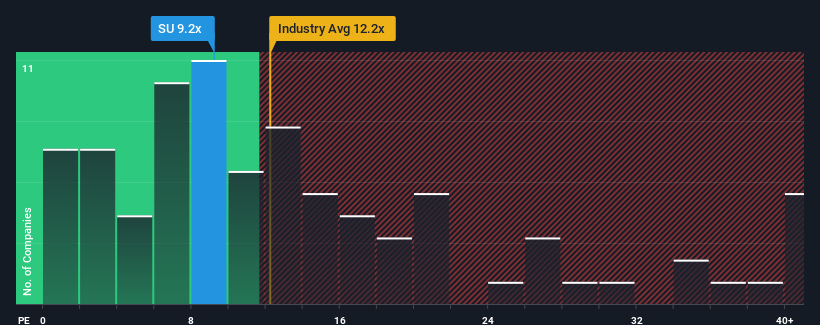- Canada
- /
- Oil and Gas
- /
- TSX:SU
Suncor Energy Inc.'s (TSE:SU) Share Price Is Matching Sentiment Around Its Earnings

Suncor Energy Inc.'s (TSE:SU) price-to-earnings (or "P/E") ratio of 9.2x might make it look like a buy right now compared to the market in Canada, where around half of the companies have P/E ratios above 16x and even P/E's above 31x are quite common. However, the P/E might be low for a reason and it requires further investigation to determine if it's justified.
Suncor Energy certainly has been doing a good job lately as its earnings growth has been positive while most other companies have been seeing their earnings go backwards. It might be that many expect the strong earnings performance to degrade substantially, possibly more than the market, which has repressed the P/E. If you like the company, you'd be hoping this isn't the case so that you could potentially pick up some stock while it's out of favour.
View our latest analysis for Suncor Energy

Is There Any Growth For Suncor Energy?
The only time you'd be truly comfortable seeing a P/E as low as Suncor Energy's is when the company's growth is on track to lag the market.
If we review the last year of earnings growth, the company posted a terrific increase of 29%. Pleasingly, EPS has also lifted 497% in aggregate from three years ago, thanks to the last 12 months of growth. Accordingly, shareholders would have probably welcomed those medium-term rates of earnings growth.
Turning to the outlook, the next three years should bring diminished returns, with earnings decreasing 5.8% each year as estimated by the nine analysts watching the company. That's not great when the rest of the market is expected to grow by 9.5% per year.
With this information, we are not surprised that Suncor Energy is trading at a P/E lower than the market. However, shrinking earnings are unlikely to lead to a stable P/E over the longer term. There's potential for the P/E to fall to even lower levels if the company doesn't improve its profitability.
What We Can Learn From Suncor Energy's P/E?
We'd say the price-to-earnings ratio's power isn't primarily as a valuation instrument but rather to gauge current investor sentiment and future expectations.
We've established that Suncor Energy maintains its low P/E on the weakness of its forecast for sliding earnings, as expected. At this stage investors feel the potential for an improvement in earnings isn't great enough to justify a higher P/E ratio. Unless these conditions improve, they will continue to form a barrier for the share price around these levels.
We don't want to rain on the parade too much, but we did also find 2 warning signs for Suncor Energy (1 doesn't sit too well with us!) that you need to be mindful of.
Of course, you might also be able to find a better stock than Suncor Energy. So you may wish to see this free collection of other companies that have reasonable P/E ratios and have grown earnings strongly.
New: Manage All Your Stock Portfolios in One Place
We've created the ultimate portfolio companion for stock investors, and it's free.
• Connect an unlimited number of Portfolios and see your total in one currency
• Be alerted to new Warning Signs or Risks via email or mobile
• Track the Fair Value of your stocks
Have feedback on this article? Concerned about the content? Get in touch with us directly. Alternatively, email editorial-team (at) simplywallst.com.
This article by Simply Wall St is general in nature. We provide commentary based on historical data and analyst forecasts only using an unbiased methodology and our articles are not intended to be financial advice. It does not constitute a recommendation to buy or sell any stock, and does not take account of your objectives, or your financial situation. We aim to bring you long-term focused analysis driven by fundamental data. Note that our analysis may not factor in the latest price-sensitive company announcements or qualitative material. Simply Wall St has no position in any stocks mentioned.
About TSX:SU
Suncor Energy
Operates as an integrated energy company in Canada, the United States, and internationally.
Undervalued with excellent balance sheet and pays a dividend.
Similar Companies
Market Insights
Community Narratives



